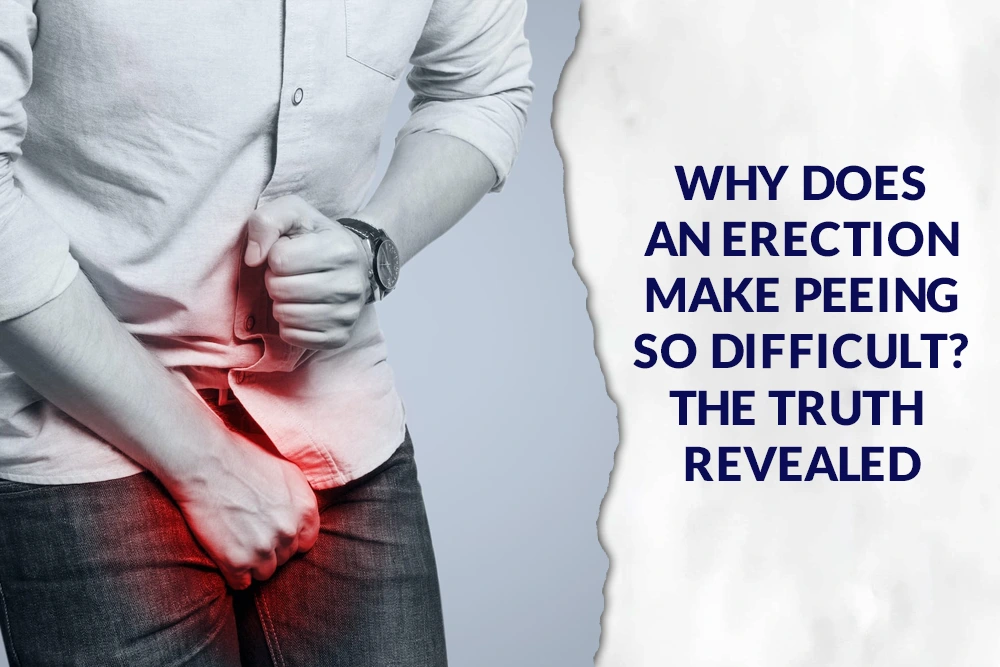Many men have struggled to urinate while they were erect. From a biological perspective, this action, which is sometimes referred to as “peeing with a boner” or “peeing with an erection,” is both frustrating and fascinating. To understand why this occurs, we must examine the structure and physiology of the male body, particularly its plumbing system, which can be utilized for two purposes, and the biological processes that occur during an erection and when it is time to visit a doctor.
What is the cause of an erection?
An erection comes about when the penis becomes engorged with blood as a result of a complex interplay of psychological, neurological, vascular, and endocrine factors. The parasympathetic nervous system releases neurotransmitters like nitric oxide and acetylcholine when physical or psychological arousal occurs, and this relaxes the smooth muscles of the penile artery. This allows blood to flow into the corpora cavernosa, two structures of the penis, so it will become erect and enlarged. Veins are compressed by muscles to lock in blood inside the penis, creating stiffness. Erections result from sexual excitement, fantasy, or spontaneously, like while asleep (nocturnal penile tumescence).
The plumbing system of the body has two uses:
The urethra is a significant component of the male urine and sexual systems. This tube serves two purposes:
- It transports urine from the bladder to the outside of the body.
- During the sexual climax, ejaculation transports the sperm around.
The body contains a sophisticated system of sphincters and valves that ensure these functions don’t interfere with one another. These systems prioritize reproduction over urination when you erect, making it difficult or impossible to pee. One major reason why it’s difficult to pee when you’re erect is that your plumbing system has two functions.
The “Lock Mode” of the Body During an Erection
An erection produces a lot of changes in the body that prepare it for sexual activity. This is what occurs:
- Increased Blood Flow: During sexual arousal, nitric oxide is released, which causes the relaxation of smooth muscles in your penile vessels and corpora cavernosa. This, in turn, allows blood to flow into the penis, making it rigid.
- Internal Urethral Sphincter Activation: As a man ejaculates, the internal urethral sphincter at the bladder base squeezes tightly to prevent sperm and urine from mixing. In an erection, this “lock mode” ensures that semen alone can travel through the urethra.
- Pressure Dynamics: Getting an erection makes it more difficult to pee since the pressure within the penis increases. It’s more difficult for pee to be able to move freely since the tissues surrounding it are compressed against each other.
These biological phenomena account for the reason why boner peeing seems so difficult to do—it’s simply the way the body ensures sexual functions are given priority over bladder functions.
Why it hurts or is impossible to pee when you have an erection
Attempting to pee while standing can be uncomfortable or even painful for several reasons:
- Angle and Position: When the penis is pointed straight up, it points up, making it difficult to direct pee downhill into a toilet.
- Muscle Tension: When the internal urinary sphincter tightens, it shuts off pee flow. It takes more effort to let these muscles relax.
- Psychological Issues: Stress or frustration at not being able to pee worsens the condition.
Despite these issues, peeing with an erection most of the time is not harmful. Relaxation techniques, such as slow breathing or splashing cold water on your body, can calm muscle tension and facilitate the flow of urine.
When should you visit your doctor?
It’s usual to struggle to pee at times when you’re erect, but these symptoms can indicate there are underlying health issues:
- If you experience pain while urinating or getting an erection, you might have a urinary tract infection (UTI) or some other issue with your bladder or prostate.
- Problems That Continuously Come Up
- Urinating: If you are still unable to use the toilet after your erection has passed, this may be an indication of urine retention that requires immediate medical attention.
- Frequent Erectile Dysfunction: Being unable to get or maintain an erection is known as erectile dysfunction (ED). If you frequently have issues with ED and your bladder, then you should visit a doctor to get checked out.
Problems such as an enlarged prostate, chemical problems, or nerve damage might be the causes. In order to identify potential health issues, it is essential to understand what causes an erection and how it impacts the functioning of the bladder.
Summary
The two-purpose plumbing system of the male body and the fact that sexual activities take precedence over biological function when sexually excited make it difficult to urinate while erect. During erection, the internal urethral valve tightens and penile pressure increases, and flushing becomes virtually impossible. This can be frustrating or embarrassing but rarely dangerous.
But if you continue to have issues with peeing or erections, you might need to consult a doctor. Call a doctor immediately if you are experiencing pain, have difficulty urinating, or have frequent symptoms of erectile dysfunction.
Determining what makes an erection happen removes the mystique from a common experience and demonstrates how cleverly our bodies are designed to perform two distinct tasks: make babies and remove waste. You can take care of yourself better if you understand more about these processes and when to seek professional assistance.









Leave a Reply